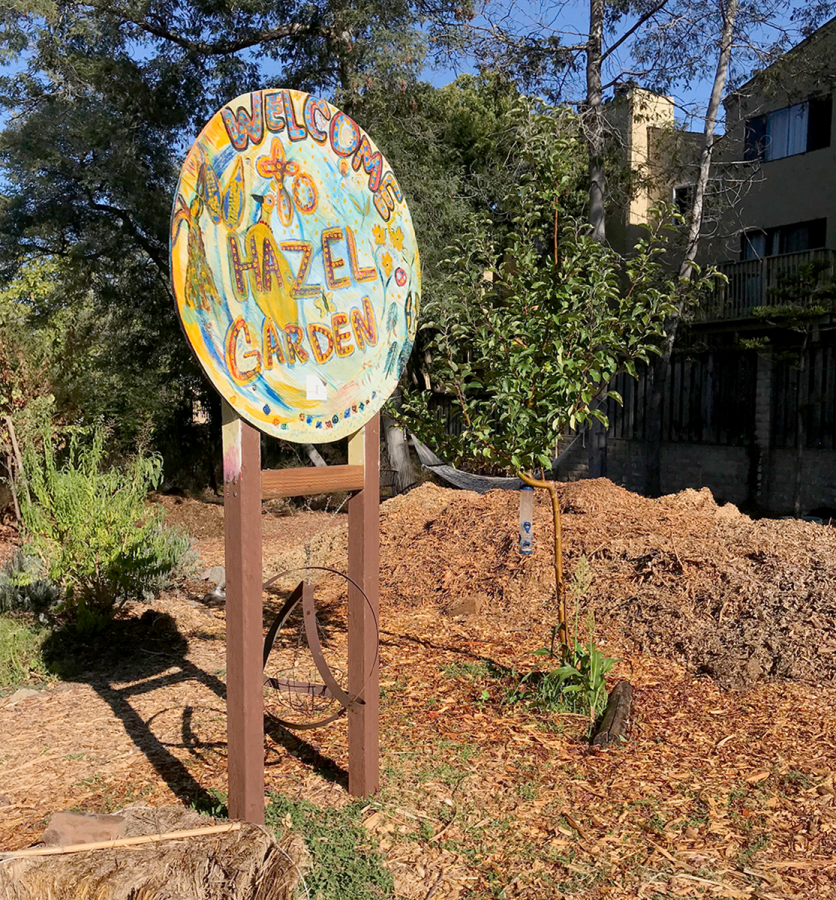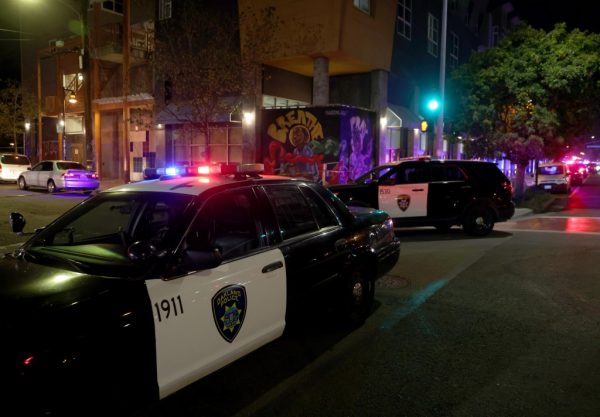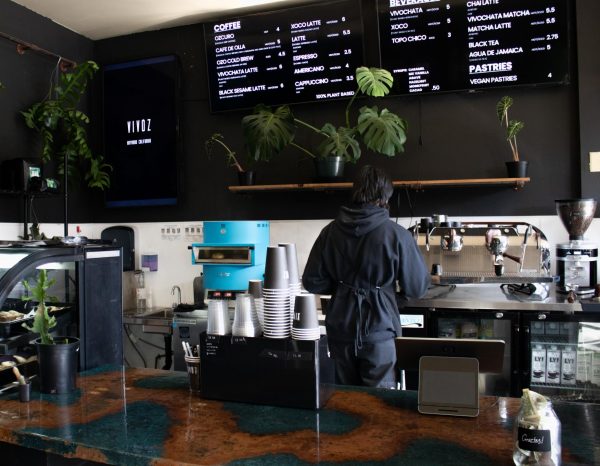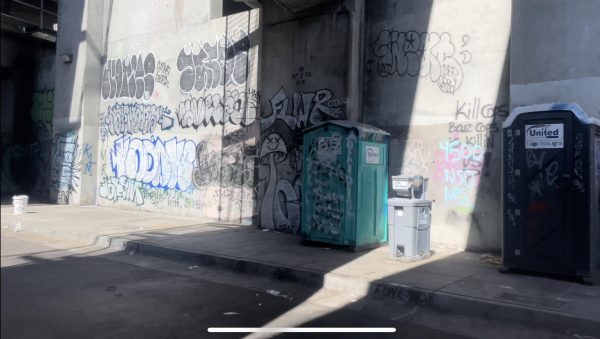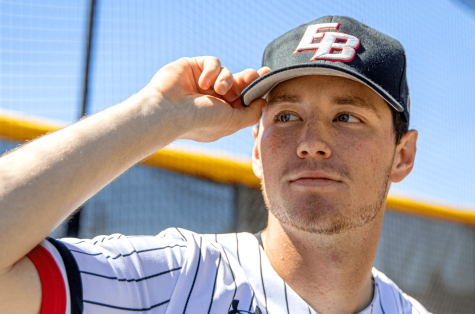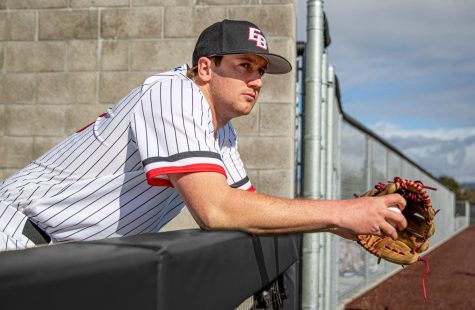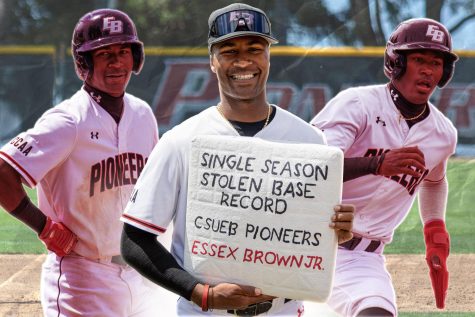Neighborhood garden seeks to end food deserts
PHOTOS BY ERIKA MARTINEZ/THE PIONEER
ABOVE: A handmade signs designates the area and welcomes patrons to the Hazel Garden. BELOW: Benjamin Collier watering the plants at his community garden.
October 26, 2018
For as long as I can remember, there has been an endless stream of liquor stores and fast food restaurants within walking distance from my home in Hayward, Calif.
Processed foods are at the fingertips of the average Californian, with much more effort necessary to access alternative, healthier options by making efforts such as attending local farmers markets.
Opportunities to provide affordable and healthy food for low-income neighborhoods is limited as Bay Area housing prices continue to get more expensive and homelessness is far from depleting, as reported in a previous Pioneer article “Heart of the Bay is under a housing crisis”.
However, some Hayward residents are moving towards food reform. Benjamin Collier, the founder of Neighborhood Orchards, is taking matters into his own hands to make it possible for the Hayward community to have free access to organic natural foods.
Neighborhood Orchards is a community-based organization that converts vacant land into community gardens to produce organic fruits, vegetables and herbs. The intersection of Hazel Ave. and Main St. in Hayward was once a vacant lot but has since become the Hazel Community Garden where a variety of plants and foods are harvested.
“It’s really about community empowerment, taking charge of your health, taking charge of the community, taking charge of just the natural environment around you,” said Collier to The Pioneer.
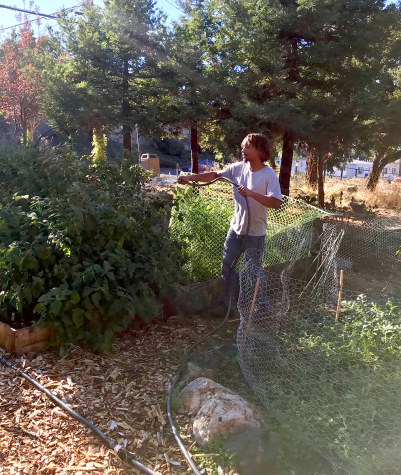 Collier says that Hazel Garden is a free public space for all residents to pick up and grow their own produce. There has been no recollection of theft at the garden but he does say that it has become an attraction for deer who stop by and eat the food.
Collier says that Hazel Garden is a free public space for all residents to pick up and grow their own produce. There has been no recollection of theft at the garden but he does say that it has become an attraction for deer who stop by and eat the food.
Collier took the risk about five years ago to pursue Hazel Garden because he did it without the city’s approval. “We should be able to go outside and be able to pick,” Collier said. He was surprised to have received support from the city of Hayward, considering that he could have possibly faced problems for taking over an empty piece of land.
One of Neighborhood Orchard’s goal is to eliminate food deserts across the U.S. beginning in Hayward. Collier aims to send out his message of action throughout the U.S. to inspire people in other states to do the same.
“A food desert is an area that doesn’t have the resources, it has fast food, it has liquor stores, it has processed foods, but it doesn’t have natural healthy living food,” said Collier.
The United States Department of Agriculture, USDA, has classified parts of Hayward like Cherryland and Tennyson as food deserts.
Collier says that the lack of healthy food options in his city of ten years has motivated him to make a change and continue providing more community gardens. “For as many liquor stores and fast food restaurants there is in the neighborhood, there should be as many foods growing places in the neighborhood,” Collier said.
Food deserts are not the only issue stopping communities from consuming healthily. Affordability of healthy and organic food plays a huge role, considering that a majority of Hayward residents come from a low-income background.
Organic foods are more expensive than processed and fast food options. Organic foods are on average 47 percent more expensive than their non-organic counterparts, according to Consumer Reports.
“Food is medicine and the foods that we really need that are healing to us, we don’t really have as much access to, or they’re expensive,” said Collier. “Farmacy” is a term that Collier twisted around from the original “pharmacy” to bring awareness to the power of growing organic produce. Through this, he depicts the comparison between the natural elements that herbs and natural foods contain to man-made foods and medications that contain chemicals.
Collier claims that there should not be a price on healthy foods that come from natural resources.
“These are the things that are for us, this is our actual medicine and it doesn’t take anything but a seed for it to grow,” said Collier.
Anyone can check out, pick food or contribute to Hazel Garden at any time. However, every third Saturday of the month, Neighborhood Orchards holds a garden clean up for the community to participate in.
Neighborhood Orchards does not accept monetary contribution and it is purely based on voluntary work and community involvement. “I find that it doesn’t take the masses to get things done, it just takes a few dedicated or devoted individuals that are willing to do something,” said Collier.
“For as many liquor stores and fast food restaurants there is in the neighborhood, there should be as many foods growing places in the neighborhood,”
—Benjamin Collier, Neighborhood Ochards Founder




